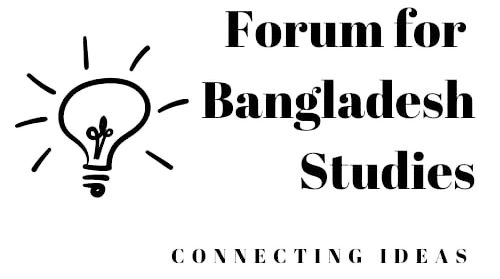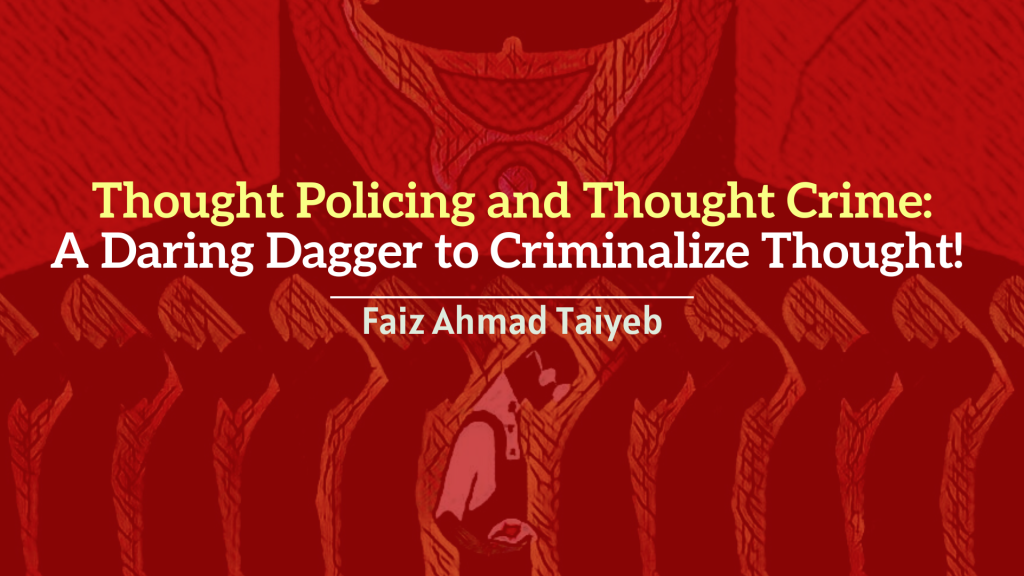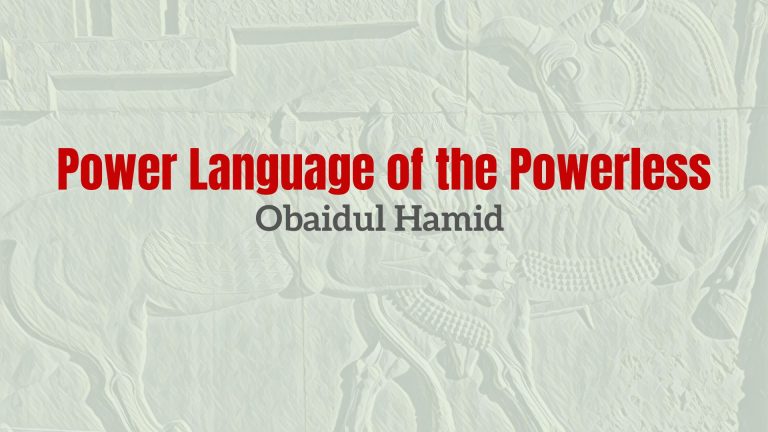George Orwell’s novel 1984, published in 1949, exemplifies the authoritarian idea of criminalizing thought. Although the dystopian novel is social science fiction, it is essentially cautionary. The story takes place in the fictional totalitarian state of Oceania, where the ruling party led by Big Brother exerts total control over every aspect of the citizens’ lives. The protagonist, Winston Smith, works for the government and later starts a rebellion against the tyrannical regime. Winston becomes disillusioned with the propaganda and conflict in society and begins to write his thoughts in a diary, although this is a forbidden act in the eyes of Big Brother. He meets a mysterious lady named Julia and the two begin a love affair, leading to Winston’s further dissent against the government. He became involved with a subversive group and was eventually captured and tortured by the Thought Police until he fully surrendered to the government.
Throughout the novel, the government’s use of language as a tool of control and manipulation is a central theme. The concept of “doublethink” and “Newspeak” are introduced, where citizens are made to accept contradictory ideas as truth and language is limited to prevent dissent. The novel is a political commentary on the dangers of totalitarianism and the extreme manipulation of ‘language and information’ to control the masses. It serves as a warning against the rise of totalitarianism and the dangers of government surveillance and manipulation. The themes of the novel ‘1984’ are still relevant today, especially for government agencies dealing with surveillance, misuse and manipulation of information. The novel is widely discussed as a cautionary tale about the danger of absolute power in which the individual gives up his freedom in the illusion of security, and the consequences of this giving up freedom.
The question is, what is the relevance of George Orwell’s ‘1984’ in Bangladesh? Almost all past governments in Bangladesh have used more or less force to maintain power. However, since 2014, a different type of governance has been running here. In Bangladesh, in 2011, the ‘caretaker government’ system was abolished and elections under a party government were ensured. Since its independence, Bangladesh had no fair election under a party system. 2014 witnessed a one-party national election where the ruling party’s victory was confirmed before the election itself. In 2018, the voting was held the previous night. The opposition is not able to protest for some miraculous reason, there is a link between the denial of court bail and opposition movement, the surveillance of the bank accounts, income tax files of the opposition leaders. Few Newspapers, TV channels, banks and business establishments of political opponents have been handed over or occupied or closed in a peaceful political process.
The government has powerful surveillance networks, Israeli intelligence surveillance technology and Chinese artificial intelligence big data processing software. Opposition political activists and journalists are routinely arrested under the Digital Security Act. Writer Mushtaq Ahmed, who was arrested under this law, died in prison. “Article Nineteen” gave an example of 2021 and said that 40 percent of the cases in Bangladesh under the Digital Security Act that year were just because of criticism of Prime Minister, Minister and various levels of leaders of the government. Total 1,109 cases file under the DSA in four years, A total of 2,889 persons were made accused, of them, 38.74 per cent or 1,119 were detained. Identities of only 1,029 persons accused in the case were available. The rate of detention is higher among the students as 71 per cent of the accused students were detained. Nothing can be said against the top leadership i.e. Big Brother!
Human rights organizations have a long list of disappearances and extrajudicial killings against Bangladesh. There are two US sanctions against the country’s elite force. According to the Hong Kong-based Asian Human Rights Commission, between 2009 and June 2022, when the current AL government came to power, 619 people went missing after being detained by security forces in Bangladesh, while at least 2,658 people were extrajudicially killed. Surprisingly, a few hundred police members were awarded, whom are accused of torturing political opponents & even students. In January, the Home Minister himself told the Parliament, ‘Modern technology like Open Source Intelligence Technology has been added to National Telecommunication Monitoring Centre to stop various activities ‘against the country and the government’ through social media monitoring (surveillance) on the Internet. At the same time, initiatives have been taken to launch an integrated lawful interception system.
In 2023, one of the top book publishers in Bangladesh was banned from the National Book Fair for publishing three books. Being already under US sanctions, the regime wants to avoid records of hard censorship against books. Hence they are imposing smart censorships. The ultimate purpose is to discourage criticism against the regime, to stop countering its so-called development narratives. There is allegations of stopping newspaper advertisements against the agencies, submitting complaints to employers just for Facebook comments or critical writings. Government has reduced grants to various study centres too. It was warned that, passports of expatriate critics would be cancelled, foreign work visa validity too threatened.
The Chief Justice himself suspended the High Court’s verdict in favor of Adarsh. That is, the highest court has failed to take an unconditional position in favor of the author’s rights and freedom of expression. There are more examples of using police and courts to criminalize thoughts & dissent voices. The draft of the new data protection law exempts state intelligence and law enforcement agencies, meaning that agencies would violate privacy laws in a manner similar to Orwell’s 1984.
We also see the Bangladesh government’s use of language manipulation. Just like Orwell’s 1984. ‘Unstoppable development’, ‘constitutional elections’, ‘Digital Bangladesh’, ‘Less democracy, more development’, ‘Who is the alternative?’, ‘Futonto korai, jolonto unun (from pan to the fire)’- necessary demand for the restoration of democracy, good governance & anti-regime criticism is dismissed uttering these narratives. The only argument is that, as development is ongoing, a fair election is not necessary. All anti-people activities of the government are being measured in terms of ‘development’.
George Orwell’s ‘1984’ is becoming relevant in Bangladesh. Authoritarian governments have expanded the practice of thought policing, criminalizing thought to ensure unaccountable power. This moral and cultural policing to criminalize intellectual work, research, creativity, and thought is an ominous signal for a country. Attempting to trade off the writer’s freedom in the name of blocking government criticism is just a tool to ensure a crippled nation.




